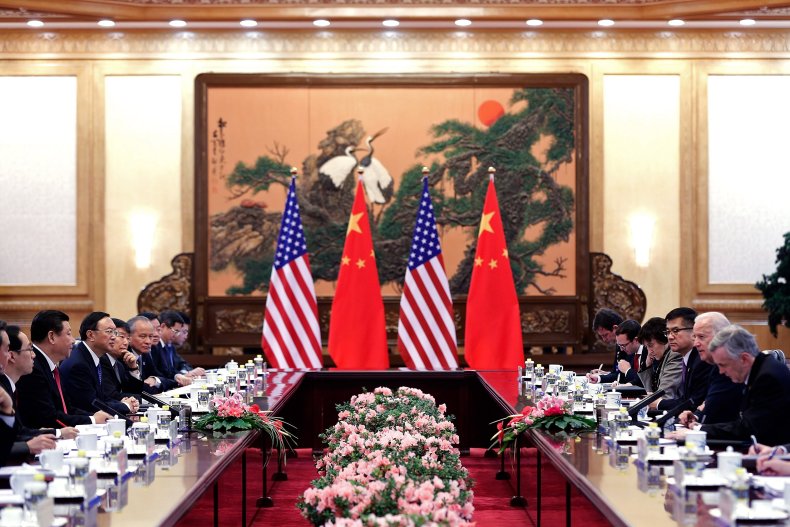China's Xi Jinping Warns Against Cold War 'Relapse' Before Meeting Joe Biden
Chinese President Xi Jinping on Thursday cautioned against a return to Cold War-era confrontation in Asia during what was probably his final public address before holding talks with President Joe Biden in the coming days.
U.S.-China ties are seeing subtle signs of improvement in spite of lingering disagreements that have left the relationship simmering for most of the year. The countries surprised observers late on Wednesday when they announced at COP26 in Glasgow plans to jointly address climate issues.
In yet another virtual address, this time at the Asia-Pacific Economic Cooperation (APEC) CEO Summit, China's Xi told the region to reject political "discrimination and exclusion."
"Attempts to draw ideological lines or form cliques on geopolitical grounds are bound to fail," the Chinese leader said, without naming the U.S., but using familiar language to reference groupings such as the Quad, as well as the newly minted AUKUS security pact between the Americans, British and Australians.
"The Asia-Pacific region cannot and should not relapse into the confrontation and division of the Cold War era," added Xi, who repeated sentiments expressed during his address—also virtual—at the United Nations General Assembly in September.
The Chinese president's remarks at APEC called on regional economies to pool resources to continue the "tortuous" fight against the COVID pandemic. He said the Asia-Pacific—a geoeconomic concept embraced fully by Beijing while it continues to reject the more geostrategic "Indo-Pacific" superregion—should work to distribute vaccines in order to close the "immunization gap."
He didn't, however, mention the unexpected U.S.-China joint declaration on climate that came out of Scotland just a few hours earlier. The American and Chinese special climate envoys, John Kerry and Xie Zhenhua, said the two nations would create a working group that would meet regularly to address the climate crisis and share related technologies.
Xi noted: "Working together, all of us can embark on a path of green, low-carbon and sustainable development."
President Biden hasn't concealed his disappointed at his Chinese counterpart's failure to attend COP26 and the G20 summit in Rome before that. Observers had predicted a likely first-ever in-person meeting on the sidelines.
Summit Next Week
But reports this week indicated that a long-awaited "face-to-face" summit between the leaders was scheduled to take place next week and possibly as early as Monday. The talks will again be virtual as Xi continues a 21-month streak of no trips outside China.
At an event hosted by the New York Times on Wednesday, Secretary of State Antony Blinken didn't confirm the exact date of the summit, but said the virtual meeting would be "coming up soon."
Blinken said the presidents have spent about five hours on the phone this year—likely referencing telephone conversations in February and September.
Biden has described the next chapter of the U.S.-China relationship as one underpinned by a struggle between democracy and autocracy. China, meanwhile, believes the U.S. is solely to blame for the downturn in relations and has articulated to American diplomats several demands that need to be met in order for the relationship to be reset.
As the rivalry intensifies, Biden has acknowledged inherent risks that could lead to "unintentional" conflict. Last week, the president said he planned to make clear to Xi that the relationship was now about "competition, not conflict," to ensure there was "no misunderstanding" between the world's two largest economies.


